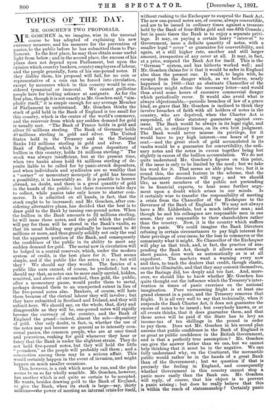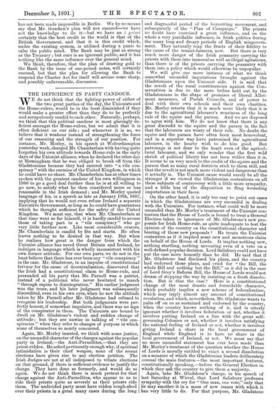TOPICS OF THE DAY.
• MR. GOSCHEN'S TWO PROPOSALS.
MR. GOSCHEN is, we imagine, wise in the unusual course he has adopted of explaining his new currency measure, and his measure for the prevention of panics, to the public before he has submitted them to Par- liament. In the first place, he may thus obtain some useful light from below ; and in the second place, the success of his plans does not depend upon Parliament, but upon the opinion which country bankers, country employers of labour, and the people generally, form of his one-pound notes. If they dislike them, his proposal will fail, for no coin or representative of a coin can be forced into circulation, except by measures which in this country would be con- sidered tyrannical or immoral. We cannot guillotine people here for looking askance at assignats. As for the first plan, though it is not exactly as Mr. Goschen said, "sim- plicity itself," it is simple enough for any average Member of Parliament to understand. Mr. Goschen thinks the stock of gold held in the Bank of England is too small for this country, which is the centre of the world's commerce, and the reservoir from which any sudden demand for gold is usually met. " The Bank of France holds in gold and silver 95 millions sterling. The Bank of Germany holds 40 millions sterling in gold and silver. The United States hold in the Treasury and in the National Banks 142 millions sterling in gold and silver. The Bank of England, which is the great depository of bullion in this country, holds 24 millions sterling." The stock was always insufficient, but at the present time, when two banks alone hold 84 millions sterling of de- posits liable to be called for by panic-struck depositors, and when individuals and syndicates are so wealthy that a " corner" or momentary monopoly of gold has become a possibility, it is lamentably so. It is possible to borrow abroad, no doubt, and there is a great quantity of gold in the hands of the public ; but these resources take days to collect, while panics take only hours to shatter com- merce. It is admitted on all hands, in fact, that the stock ought to be increased; and Mr. Goschen, after con- sidering alternative plans, has decided that the best is to draw gold to the Bank by issuing one-pound notes. When the bullion in the Bank amounts to 22 millions sterling, he will issue these notes, and the gold which the public will pay for them will be stored in the Bank's vaults, so that its usual holding may gradually be increased to 40 millions or more, and thus greatly solidify not only the real but the apparent position of the Bank, and consequently the confidence of the public in its ability to meet any sudden demand for gold. The metal now in circulation will be lodged in a central reservoir, which, under the modern system of credit, is the best place for it. That seems simple, and if the public like the notes, it is so ; but will they ? We should say they would. The fancies of a public like ours cannot, of course, be predicted ; but we should say that, as notes can be more easily carried, hidden, remitted, and above all ear-marked, than gold, the public, after a momentary pause, would prefer them to metal, perhaps demand them to an unexpected extent in lieu of the five-pound notes also. Bankers, of course, will hate them because of the clerical labour they will involve ; but they have submitted in Scotland and Ireland, and they will submit here. We should say, on the whole, that, dirty and disagreeable as they will be, one-pound notes will rapidly become the currency of the country, and the Bank of England the grand—indeed, almost the sole—depository of gold. Our only doubt, in fact, is, whether the use of the notes may not become so general as to intensify occa- sional panics, the common people, who are at once timid and penurious, rushing for gold whenever they hear or fancy that the Bank is under the slightest strain. They do not hold five-pound notes, but they will hold the little " pounders," as the people will probably call them ; and a commotion among them may be a serious affair. This would certainly happen in the event of invasion, and might happen on much smaller occasions. This, however, is a risk which must be run, and the plan seems to us so far wholly sensible. Mr. Goschen, however, has another which is not quite so certain to be accepted. He wants, besides drawing gold to the Bank of England, to. give the Bank, when its stock is large—say, thirty millions--the power of meeting an internal crisis for itself, without rushing to the Exchequer to suspend the Bank Act.. The new one-pound notes are, of course, always convertible, and are to be issued in ordinary times against a treasure held by the Bank of four-fifths gold and one-fifth Consols ; but in panic times the Bank is to enjoy a separate privi- lege. It may, on paying a certain heavy " interest " to Government, issue a definite quantity of notes, with a smaller legal " cover" or guarantee for convertibility, and again, at a still higher rate, another and still larger amount, irrespective of any cover at all. It may, in fact, at a price, suspend the Bank Act for itself. This is the " German " system, and has hitherto worked well ; and Mr. Goschen claims for it that it would be safer in England also than the present one. It would, to begin with, be- exempt from the danger which, as we believe, nearly happened in 1866—that an obstinate Chancellor of the Exchequer might refuse the necessary letter—and would thus avoid some hours of excessive commercial danger which periodically recur. It would also avoid what is always objectionable,—periodic breaches of law of a grave kind, so grave that Mr. Goschen is inclined to think they involve breaches of faith with all holders of notes in the country, who are deprived, when the Charter Act is suspended, of their statutory guarantee against over- issue. The Bank would be always in its legal right, and would act, in ordinary times, on its own best judgment. The Bank would never misuse its privilege, for it would have to pay high interest—one hears of 8 per cent. —and the great stock of gold accumulated in its vaults would be a guarantee for convertibility, the ordi- nary notes and the notes in excess together being but slightly in excess of the bullion accumulation. We do not quite understand Mr. Goschen's figures on this point, if the issue is only to be limited by the need ; but we take his word for it. That seems an able plan too ; but it is round this, the second feature in the scheme, that the Parliamentary discussion will rage ; and we should like, as mere members of the public not pretending to be financial experts, to hear some further argu- ment upon a doubt which arises in our minds. Is. it certainly wise to transfer the responsibility of meeting a crisis from the Chancellor of the Exchequer to the Governor of the Bank of England ? We may not always have a Mr. Lidderdale, but a much inferior man ; and though he and his colleagues are responsible men in one sense, they are responsible to their shareholders rather than the country. Now, it is the country which suffers from a panic. We could imagine the Bank Directors refusing in certain circumstances to pay high interest for their privilege of over-issue, be the loss to commerce or the community what it might. No Chancellor of the Exchequer will play us that trick, and, in fact, the practice of sus- pending the Bank Act, though it allows sometimes of short panics, does work as automatically as is at all expedient. The markets want a warning every now and then, to teach the dealers that credit, though elastic, cannot be illimitable, and that they may commit themselves, as the Barings did, too deeply and too fast. And, more- over, we should like to know whether Mr. Goschen has quite thought out the influence which the Treasury's inter- vention in times of panic exercises on the national imagination. Pure unreasoning fright is at least one grand element in a panic, and the Treasury removes that fright. It is all very well to say that technically, when it suspends the Bank Charter Act, it does not guarantee the excess of notes to be issued ; but everybody knows, or at all events thinks, that it does guarantee them, and that those notes will be paid if the State has to levy an income-tax of ten shillings in the pound in order to pay them. Does not Mr. Goschen in his second plan assume.that public confidence in the Bank of England is as great as public confidence in the British Government, and is that a perfectly true assumption ? Mr. Goschen can give the answer better than we can, but we cannot help thinking that it must be in the negative. We can fully understand why, on the Continent, the mercantile public would rather be in the hands of a great Bank than of the Government ; but we question if that is precisely the feeling in England, and consequently whether Government in this country cannot stop a panic more easily than the Bank can. Mr. Goschen will reply, of course, that his object is to prevent a panic arising ; but does he really believe that this is within the reach of statesmanship ? Certainly panic has not been made impossible in Berlin. We by no means say that Mr. Goschen's plan will not succeed—we have not the knowledge to do it—but we have an a priori certainty that the best credit in the world is that of the British Government, and that it is this credit which, under the existing system, is utilised during a panic to calm the public mind. The Bank may be just as strong as the Treasury ; but ours is an ignorant public, and it has nothing like the same influence over the general mind. We think, therefore, that the plan of drawing gold to the Bank by the issue of one-pound notes, will certainly succeed, but that the plan for allowing the Bank to suspend the Charter Act for itself will arouse some sharp, and possibly unfavourable, discussion.



















































 Previous page
Previous page